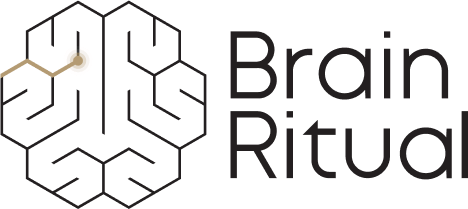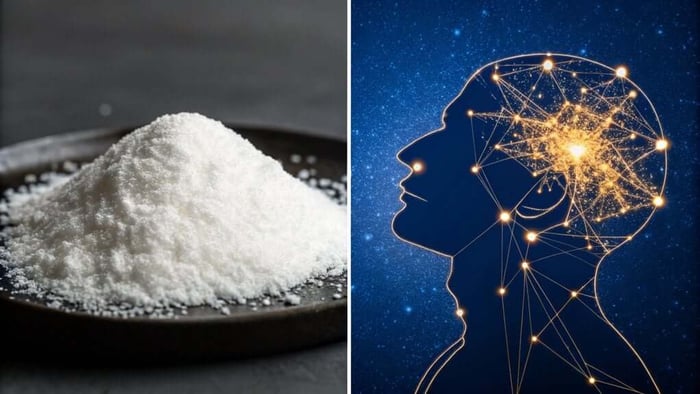At a Glance
|
Creatine plays a crucial role in your brain's energy metabolism, and research shows that creatine levels can be reduced in chronic migraine, thereby depriving the brain of an important energy reserve.
If you suffer from migraine, you'll likely have lower brain creatine levels, particularly in the thalamus region.
This deficiency can compromise your brain's energy production, making you more susceptible to migraine attacks and slower to recover between episodes.
There is some indication that creatine supplementation may be able to positively impact migraine by supporting mitochondrial function, acting as an antioxidant, and helping regulate key neurotransmitters.
Understanding the connection between brain energy and migraine opens new doors for effective management strategies.
In this article you will learn all ins and outs of creatine and how it can impact migraine.
Understanding the Brain Energy, Migraine and Creatine Connection
Prior, during and after a migraine attack, your brain experiences significant disruptions in its energy metabolism and electrical activity, leading to the cascade of symptoms you're familiar with.

Your brain's energy system relies heavily on creatine as a rapid energy buffer, helping maintain stable ATP levels needed for proper neurological function.
What Happens in Your Brain During Migraine
In migraine sufferers the brain's delicate energy balance can be fundamentally disrupted, triggering a cascade of neurological events.
During but even between attacks, your brain can experience significant mitochondrial dysfunction, leading to compromised brain energy metabolism and disrupted energy homeostasis.
Brain creatine levels typically drop, making it harder for neurons to maintain their normal energy supply, as creatine can act as an energy reserve, a backup fuel source
Phase | Brain Changes | Primary Symptoms |
Prodrome | Hypothalamic activation | Mood changes, food cravings |
Aura | Cortical spreading depression | Visual disturbances, numbness |
Headache | Trigeminal nerve activation | Intense head pain, nausea |
Postdrome | Metabolic recovery | Fatigue, confusion |
The disruption in your brain's energy systems can create a domino effect of neurological symptoms. With dropping energy levels, increased oxidative stress and inflammation, your trigeminal nerve becomes hypersensitive, leading to intense head pain.
Meanwhile, with less energy, your brain's ability to filter sensory input diminishes, making you more sensitive to light, sound, and movement. Blood vessels in your brain dilate abnormally, contributing to the throbbing sensation you experience.
This complex interplay between energy dysfunction and neural activation explains why migraine symptoms often persist until your brain's energy balance is restored.
Creatine's Basic Role in Brain Function
Just like in muscles, creatine in the brain acts as a reserve for regenerating ATP, the primary energy currency.
This is crucial because the brain is highly energy-demanding, consuming about 20% of the body's total energy at rest.
By ensuring a rapid supply of ATP, creatine helps stabilize neuronal function during periods of high energy demand or metabolic stress, such as hypoxia, ischemia, or intense cognitive tasks.
Brain energy metabolism relies heavily on creatine's fundamental role as a cellular powerhouse.
Your brain's cells depend on creatine to maintain optimal energy levels and support critical mitochondrial function.
When you have adequate brain levels of creatine, it acts as a rapid energy source by helping regenerate adenosine triphosphate (ATP) from ADP, which fuels essential cellular processes.
Creatine doesn't just provide energy - it specifically targets areas of gray matter that require constant power for cognitive function.
Your brain's energy metabolism benefits from creatine's ability to serve as a phosphate carrier, efficiently shuttling energy between cellular compartments.
This process becomes particularly crucial during periods of high mental demand or stress.
Research shows that creatine actively supports your brain's energy needs by maintaining ATP levels when demand increases.
It works by enhancing mitochondrial efficiency and providing a readily available energy reserve.
This matters because your brain consumes about 20% of your body's total energy, despite making up only 2% of your body weight.
Understanding creatine's role in brain function helps explain why optimal creatine levels are essential for maintaining healthy brain metabolism and potentially influencing migraine patterns.
Why Energy Matters in Migraine Development
Your brain's energy metabolism relies heavily on efficient ATP production and utilization, and when this system faces challenges, you're more likely to experience migraine attacks.
Studies show that mitochondrial dysfunction, which affects your cells' powerhouses, significantly impacts your brain's energy efficiency and a wide variety of metabolic issues have been found in migraine.
When your brain creatine levels are low, you'll have reduced capacity to maintain stable energy reserves, making your brain more susceptible to triggers.
This energy deficit can lead to a cascade of problems, including oxidative stress and disrupted neurotransmitter function.
Think of your brain's energy system like a delicate balance sheet - when cellular energy efficiency drops, you're essentially running on a deficit.
This energy shortfall affects crucial brain functions, potentially triggering the neurological events that lead to migraine.
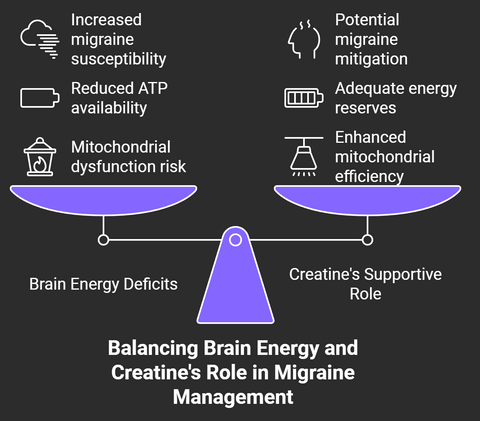
Research indicates that people who experience migraine often show signs of compromised energy metabolism in specific brain regions, particularly the thalamus.
The Link Between Creatine and Migraine Attacks
Clinical studies have found that individuals with chronic migraine typically display significantly reduced brain creatine concentrations compared to those without migraine, suggesting a direct connection between creatine deficiency and headache occurrence.
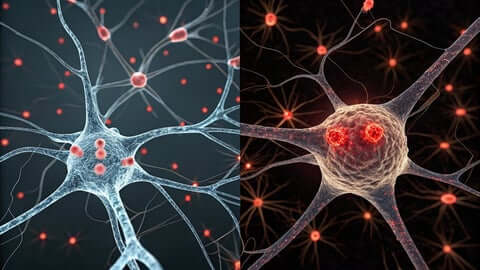
Your brain's ability to maintain stable energy levels through proper creatine function appears critical, even though clinical studies on creatine supplementation directly have not been conducted.
How Low Creatine Levels Affect Headaches
When creatine levels drop in the brain, a cascade of metabolic disruptions can trigger or intensify migraine attacks.
This brain creatine deficiency can impair your cellular energy production and compromise your neurological function.
While you're likely familiar with creatine in muscles, its role in brain health is equally crucial.
When your brain's creatine stores are depleted, mitochondrial dysfunction can occur, leading to energy deficits in brain cells.
This disruption affects your brain's ability to maintain proper nerve cell function and regulate pain signals, potentially increasing your susceptibility to headaches.
Your individual reaction to low creatine levels may vary, but possible effects include increased sensitivity to migraine triggers and longer recovery times between attacks.
The potential risks of chronic low creatine levels extend beyond immediate headache symptoms, potentially affecting your brain's long-term energy metabolism and neurological health.
Scientific Evidence of Creatine's Impact
Research shows that individuals experiencing chronic migraine often have significantly lower brain creatine levels, particularly in the left thalamus region, compared to those without migraine.
Scientific investigations have uncovered several potential mechanisms through which creatine influences migraine pathogenesis.
Your brain's mitochondrial function and energy metabolism directly benefit from adequate creatine levels, as it serves as a crucial energy buffer maintaining ATP levels.
When you're deficient in creatine, your brain's energy homeostasis becomes disrupted, potentially increasing your susceptibility to migraine triggers.
You'll find that creatine's role extends beyond basic energy production - it acts as an antioxidant and helps regulate neurotransmitter levels involved in migraine development.
However, individual responses vary significantly, with some people reporting increased headache frequency at higher doses.
Creatine Supplementation for Migraine
Several pathways suggest that there might be benefits from creatine supplementation if you experience migraine, however, direct clinical trials are still missing.
In order to find out, you might want to begin with a conservative dose of 2.5-5mg daily, as higher amounts could trigger headaches in some individuals.
While creatine could be promising for migraine management, you'll need to maintain proper hydration and consult your healthcare provider before starting supplementation, especially if you're currently taking migraine medications.
Potential Benefits of Creatine
Emerging evidence suggests that creatine supplementation could offer several key benefits for migraine sufferers.
By enhancing your brain's energy metabolism and providing metabolic and neurological support, creatine could potentially reduce the frequency and severity of migraine.
There are three primary ways creatine may benefit migraine sufferers:
- Supports neurological energy metabolism by maintaining consistent ATP levels in brain cells, potentially reducing energy deficits that can trigger migraine
- Enhances mitochondrial function, which is often impaired in migraine sufferers, leading to improved cellular energy production
- Offers potential neuroprotective effects that may help stabilize brain cell function during periods of metabolic stress
Your brain's creatine metabolism plays a crucial role in maintaining energy homeostasis, and research indicates that migraine sufferers often have lower brain creatine levels.
By addressing these deficiencies through supplementation, you may experience improved energy regulation and potentially fewer migraine attacks.
However, individual responses can vary, and it's essential to consult healthcare providers before starting supplementation.
Recommended Dosage and Approach
Safely supplementing with creatine for migraine management requires a carefully structured approach to dosing.
Ideally, starting with a conservative dose of 2.5-5g per day to assess your individual response and minimize potential side effects.
You'll want to monitor how your body reacts before considering any dose adjustments.
Maintaining proper hydration is crucial during creatine supplementation, as dehydration can potentially trigger migraine.
Aim to drink at least 8-10 glasses of mineral water daily while supplementing.
Since creatine's effects on mitochondrial function and energy metabolism develop gradually, you'll need to commit to consistent use for several weeks to evaluate its impact on your migraine frequency and severity.
Before starting creatine supplementation, consult your healthcare provider, especially if you're taking other medications for migraine management.
They can help assess whether creatine is appropriate given your specific medical history and current treatment plan.
Regular check-ins with your doctor can help optimize the approach based on your response and ensure it's effectively addressing your underlying mitochondrial dysfunction while supporting overall energy metabolism.
How Creatine Protects the Brain
Creatine's protective effects on your brain stem from its role as a rapid energy buffer, helping maintain consistent ATP levels even during periods of high metabolic demand.
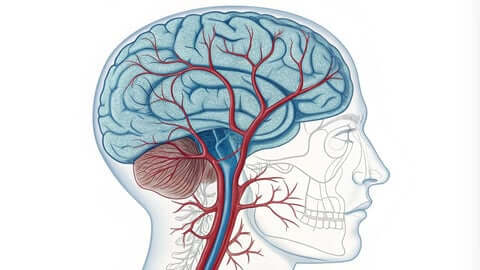
You'll find that creatine may reduce neurological stress by supporting mitochondrial function and preventing energy depletion in brain cells when they're under strain.
Through these mechanisms, creatine directly supports your brain cell health by stabilizing cellular energy systems and providing a critical defense against metabolic disruptions that could trigger neurological events.
Creatine's Energy Protection Mechanisms
When you look at how the brain protects itself from energy depletion, creatine plays a fascinating role as a cellular bodyguard.
Your brain's mitochondrial function relies heavily on creatine to maintain energy homeostasis, especially during periods of high metabolic demand.
This protective mechanism becomes particularly relevant in migraine pathogenesis, where energy metabolism disruptions often trigger neurological events.
Creatine's neuroprotection works through three critical mechanisms:
- Energy Homeostasis: Creatine sustains ATP levels during metabolic stress, ensuring neuronal function and reducing energy-related cell death.
- Oxidative Stress Reduction: It minimizes reactive oxygen species (ROS) production and oxidative damage by enhancing mitochondrial efficiency and stability.
- Mitochondrial Protection: Creatine preserves mitochondrial integrity, preventing apoptosis and supporting resilience in neurodegenerative conditions.
- on
Your brain's cells constantly use this system to guard against energy failures, with creatine serving as a crucial backup power source.
This protective mechanism is especially important in brain regions with high energy demands, where maintaining stable energy metabolism can mean the difference between normal function and neurological disruption.
Reducing Neurological Stress
Building on our understanding of energy protection, the brain's response to neurological stress reveals another key aspect of creatine's protective effects.
When your brain faces challenges, from everyday stress to more severe conditions like traumatic brain injury, creatine acts as a crucial buffer against cellular damage.
Your brain's mitochondrial function plays a central role in managing neurological stress. Creatine supports this process by maintaining stable energy metabolism, even when your neurons are under pressure.
You'll find that creatine's stress-reducing properties extend to common neurological challenges like headaches.
By maintaining proper hydration and energy balance, creatine helps your brain cells resist the metabolic disruptions that often trigger neurological symptoms.
This protective mechanism works through multiple pathways: stabilizing cell membranes, supporting ATP production, and reducing oxidative stress.
The evidence suggests that adequate creatine levels in your brain tissue can significantly enhance your natural resilience to neurological stress, potentially offering protection against both acute and chronic neurological challenges.
Supporting Brain Cell Health
Throughout daily brain function, your neurons require robust protection mechanisms to maintain their health and vitality.
Creatine plays a crucial role in supporting brain cell health through its neuroprotective effects and optimization of energy metabolism.
Your brain's mitochondrial function directly benefits from adequate brain creatine levels, helping to shield neurons from damage and stress.
Creatine supports your brain cells by:
- Enhancing cellular energy production by maintaining consistent ATP levels, allowing neurons to function optimally even during periods of high metabolic demand
- Stabilizing cell membranes and reduces oxidative stress, protecting vital neural structures from damage
- By improving overall brain energy homeostasis, creatine may positively influence mood and reduce mental fatigue.
Under medical supervision, creatine supplementation can strengthen these protective mechanisms.
Studies show that maintaining optimal brain creatine levels helps preserve cellular integrity and supports long-term neurological health.
Your brain's natural defense systems work more efficiently when supported by adequate energy and in turn adequate creatine stores, potentially reducing the risk of cellular dysfunction and improving overall neural resilience.
Practical Migraine Management Strategies
You'll want to carefully monitor your body's response while maintaining consistent hydration levels, as dehydration can potentially trigger migraine when taking creatine supplements.
To maximize potential benefits, you should integrate creatine supplementation into your existing migraine care plan while tracking your symptoms to determine its effectiveness for your specific situation.
Integrating Creatine into Migraine Care
The successful integration of creatine into migraine care requires a systematic, evidence-based approach tailored to individual patient needs.
When considering creatine supplementation as part of your migraine management strategy, it's essential to understand how it supports energy metabolism and mitochondrial function in your brain.
Currently it is suggested following these key implementation steps:
- Start with low dosage considerations (2.5-5mg daily) and gradually adjust based on your response, while maintaining detailed symptom tracking
- Optimize hydration levels by increasing mineral water intake to at least 8-10 glasses daily when supplementing with creatine
- Monitor your migraine patterns, frequency, and intensity through a dedicated journal to assess effectiveness
You'll need medical supervision throughout this process, particularly if you're taking other medications.
Remember that creatine's effects on energy metabolism may take several weeks to become apparent, so patience and consistent supplementation are crucial.
Regular assessment of your symptoms and careful documentation will help determine if creatine supplementation is effectively supporting your migraine management goals.
Frequently Asked Questions
You may still have some questions about the relationship between creatine and migraine. To shed even more light on this topic we’ve compiled a list of frequently asked questions we haven't covered in the article.
Are there potential interactions between creatine and migraine medications?
Yes, it's crucial to consult your healthcare provider before starting creatine, as interactions with existing migraine medications can occur. Professional medical guidance helps ensure safe integration of creatine into your migraine management strategy.
How might water retention from creatine affect migraine symptoms?
Proper hydration is essential when taking creatine. While water retention is a known side effect, maintaining adequate hydration (8-10 glasses of mineral water daily) can actually help reduce migraine triggers and support overall brain energy metabolism.
What natural sources of creatine might help migraine sufferers?
A balanced diet including organic meats, fish, and some plant-based proteins can provide natural creatine. However, dietary sources may not match the concentrated benefits of targeted supplementation.
For example, beef and salmon are excellent sources of creatine, delivering about 2 grams of creatine per serving. Consuming these foods as part of a balanced diet may help maintain adequate creatine levels, which can support energy metabolism in the brain.
Additionally, chicken and pork are other meat options rich in creatine, while certain fish, like tuna and cod, also contribute beneficial amounts.
For individuals who follow a vegetarian or vegan diet, it's important to note that creatine is primarily found in animal products.
While some plant-based foods, such as spinach and mushrooms, contain trace amounts of creatine, they do not provide sufficient levels to significantly impact neurological health or migraine management.
Are there risks of developing headaches when taking creatine?
Interestingly, some individuals might experience increased headache frequency at higher doses. Starting with a conservative dose (2.5-5g daily) and carefully monitoring your body's response is recommended to minimize the risk of headaches.
Can creatine supplementation help beyond migraine management?
Beyond potentially reducing migraine intensity, creatine offers broader neurological benefits, including supporting grey matter, enhancing mitochondrial function, and providing neuroprotective effects that can support overall brain health, including mental health.
Are there specific populations who might benefit most from creatine for migraine management?
Yes, certain populations may derive significant benefits from creatine supplementation in managing migraine. These groups can include:
- Individuals with chronic migraine: Chronic migraine sufferers, defined as experiencing 15 or more headache days per month, can particularly benefit from creatine.
- Athletes and active individuals: Athletes or those who engage in regular high-intensity exercise may find creatine beneficial not only for improving physical performance but also for managing exercise-induced migraine. These individuals often face dehydration or energy depletion, both potential triggers for migraine.
- Vegetarians and vegans: People following vegetarian or vegan diets may have lower natural creatine levels since creatine is predominantly found in animal products. Consequently, these individuals can benefit from creatine supplementation to support not only energy levels but also brain health, as they may be at a higher risk for migraine due to potential nutrient deficiencies.
- Patients with mitochondrial disorders: Individuals with mitochondrial disorders or compromised energy metabolism may experience heightened susceptibility to migraine. Mitochondrial dysfunction can lead to impaired energy production in brain cells, which is a critical factor in the onset of migraine attacks.
Conclusion
Creatine supplementation may help manage migraine by improving brain energy metabolism, as individuals with chronic migraine often have lower creatine levels.
By supporting mitochondrial function and stabilizing ATP production, creatine can potentially help reduce the frequency and severity of attacks.
Starting with a low dose, staying hydrated, and tracking symptoms are key for success. Always consult a healthcare provider before beginning supplementation, especially if you’re on other medications.
With consistent use, creatine may offer a valuable tool for migraine support.
